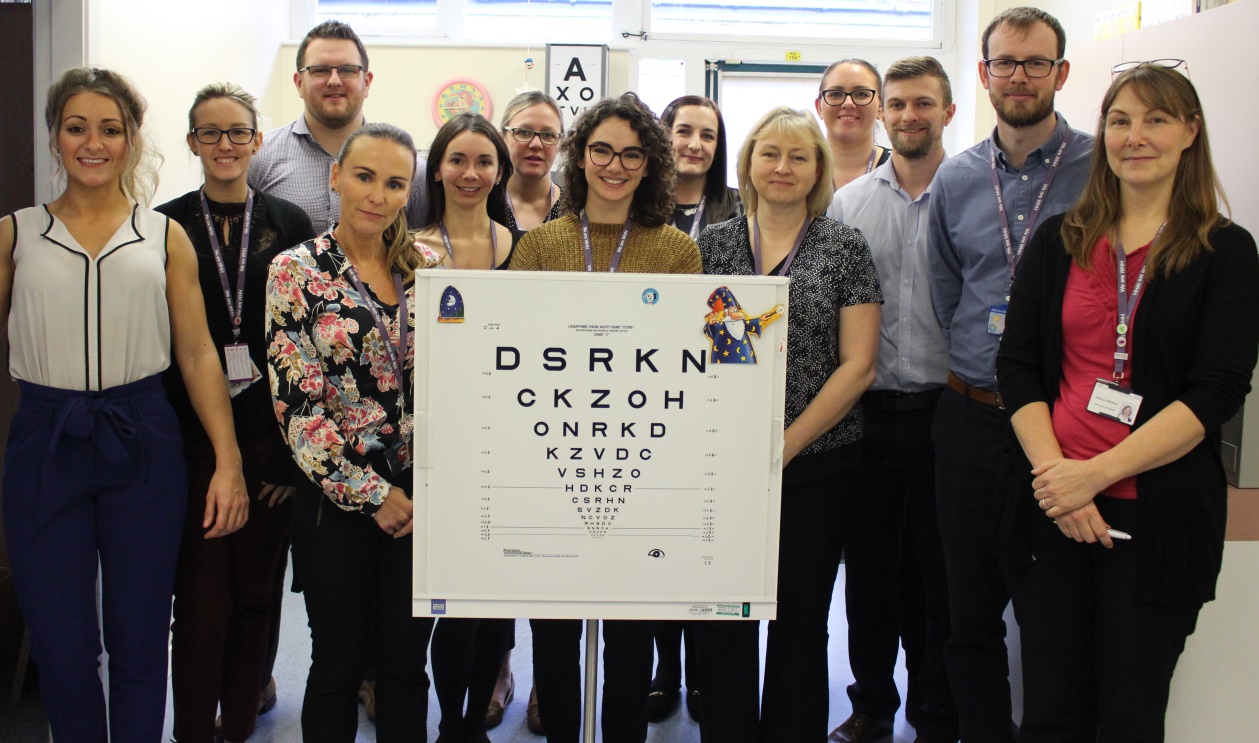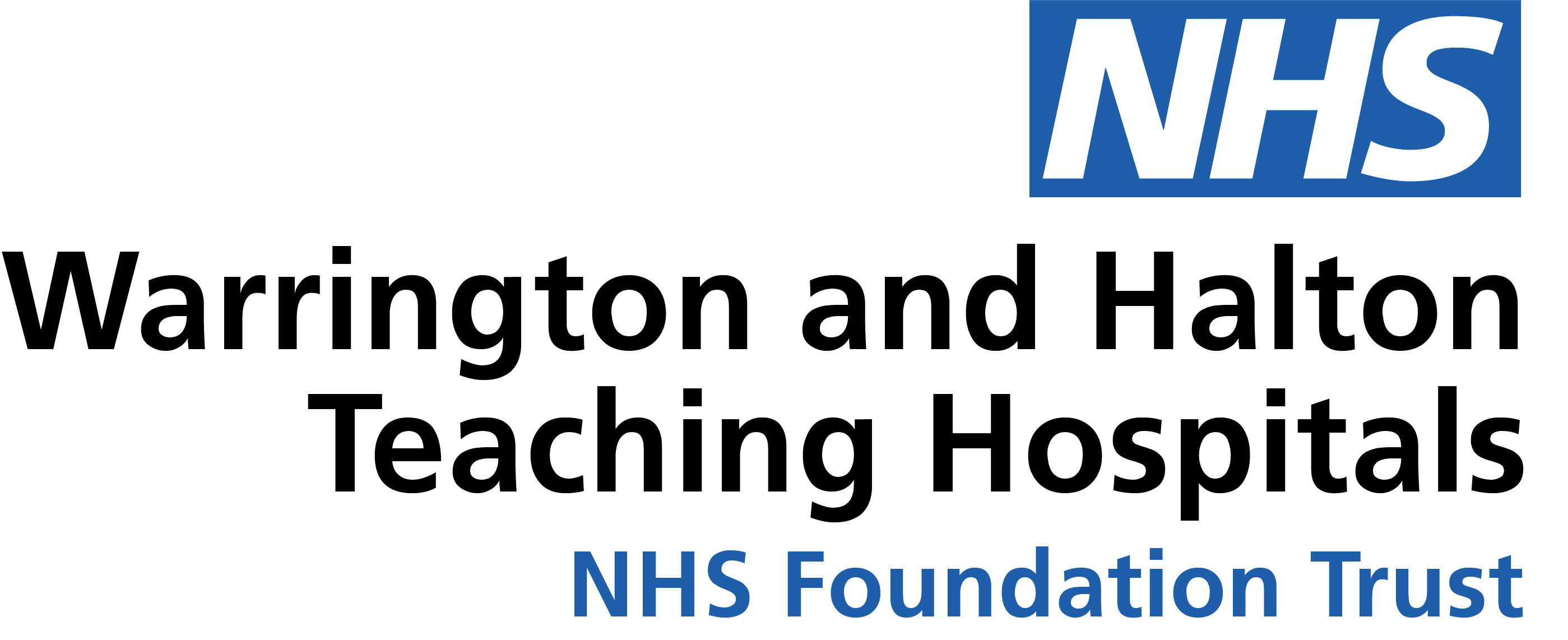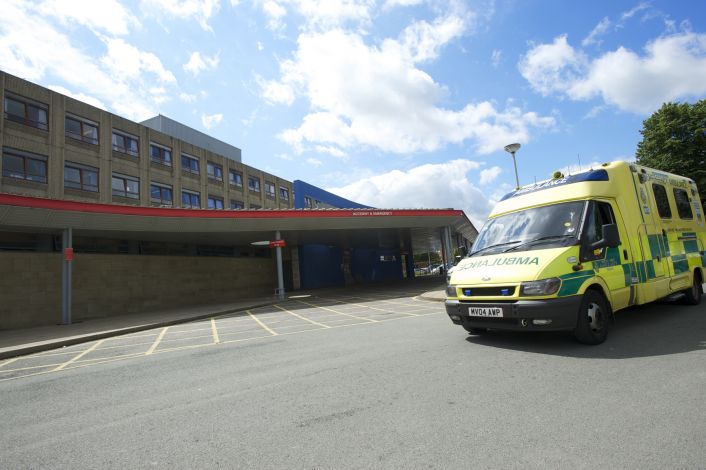If you live in Halton your next Orthoptic appointment may be at the new Halton Health Hub at Runcorn Shopping City. The Hub has NHS signage and is a short walk from Car Park 3 which has ample disabled and parent parking bays and is free of charge. When you arrive you will find that the front windows are fully frosted so passers by cannot see people in the waiting area and the reception desk is set back from the front doors. All of our treatment rooms are fully private.
Please remember to bring your glasses with you as normal.
Services will continue as normal at the Warrington site and any patients attending Warrington clinics will not be affected by this change.
The Orthoptic Department provides the following services:
- Hospital and community Orthoptic clinics
- Orthoptic support to joint Optometry and Orthoptic clinics for new and follow up paediatrics, Consultant led ocular motility clinics and general and specialised Ophthalmology clinics for adults and paediatrics.
- Pre-operative and post-operative assessment clinics
- Primary visual screening to children in reception class in Warrington
- Visual processing disorder assessment and treatment
- Orthoptic led Special Educational Needs service in special schools and child development centres
- Screening of premature and low birth weight babies (retinopathy of prematurity)
- Specialist stroke clinics
- Monitoring of neurological visual fields
- Glaucoma virtual review clinics
- Intravitreal injection clinics
Orthoptists are the experts in diagnosing and treating defects in eye movement and problems with how the eyes work together, called binocular vision. These can be caused by issues with the muscles around the eyes or defects in the nerves enabling the brain to communicate with the eyes.
Orthoptists see patients with a wide range of conditions affecting their vision. Patients may be directly experiencing symptoms such as blurred, oscillating or double vision, or they may exhibit outward signs, such as misalignment or uncontrolled movement of the eyes or abnormal head positions.
They are trained to offer a range of treatments in the management or correction of these conditions. This may include eye patches, eye exercises, prisms or glasses.
Orthoptists are Allied Health professionals (AHP’s) and are registered with the HCPC.

We have a team of Orthoptists who specialise in assessing and treating children with special educational needs (SEN) and visual impairment who attend special schools and child development centres. It is essential that these children have any visual function problems detected as early as possible to ensure their learning can be tailored to their particular needs. Up to 80% of children with special needs have associated visual difficulties and the Orthoptists work within a multi-disciplinary team to maximise the potential of these children. We also assess and support children in mainstream school with visual impairment and work closely with the teachers for the visually impaired.
Children who are not progressing at school and have difficulties with reading, writing and spelling can access our specialist team of Orthoptists in the Visual Processing Clinic. Children have their visual perception skills assessed alongside visual educational tests which identify any defects of visual processing which may be contributing to their difficulties at school. The Orthoptists work very closely with the SENCO, teachers at school, occupational therapy and education psychology teams to ensure children are supported with any visual therapy or advice that may help their learning.
We provide a vision screening programme to reception class children in Warrington (children in the Halton area are screened by a different team). Early identification of reduced vision or binocular vision defects allows treatment to be effective whilst a child’s visual system is developing. There is a critical period of time in which treatment to improve the level of vision in a child must be undertaken before treatment is no longer effective and leaves permanent visual loss. This critical period is treatment before the age of 8 years old in most cases.
Babies who are born prematurely or of low birth weight are 3 times more likely to have a squint, require glasses or have other visual problems than babies born at term. The Orthoptists assess these children to detect and treat any visual problems early.
A team of orthoptists specialised in identifying visual impairments caused by stroke or acquired brain injury assess patients on the wards in Warrington Hospital. Around 60% of patients who have a stroke will have a visual impairment and it is important that orthoptists are part of the core multi-discliplinary stroke team to assess the vision of these patients.
Patients with glaucoma who attend the Ophthalmology department glaucoma assessment clinics may then have their notes virtually reviewed by some of the specialist Orthoptic team to monitor for any changes in their condition.
Some of the specialist Orthoptic team are trained in administering intravitreal injections in patients with retinal conditions such as age related macular degeneration and diabetic retinopathy.
Patients with stable neurological problems which affect their peripheral vision may have their visual fields and visual function monitored by the Orthoptists in their neuro-visual fields clinics. They work closely with Ophthalmologists, Endocrinologists, Neurologists and Neurosurgeons to monitor these patients.
Double Vision
This symptom results from when one of your eyes starts to turn inwards, outwards, upwards or downwards. There can be a number of reasons why your eye starts to turn; sometimes it is due to an eye muscle weakness that you were born with that is starting to deteriorate as you get older. Other times it may be the nerve that supplies your eye muscles that becomes weak.
There are a number of ways double vision can be helped. Sometimes, glasses can help correct double vision. Exercises can also help strengthen your eye muscles and stop double vision. If exercises or glasses are not appropriate, you can be given a prism, which is a plastic cover that sticks on one lens of your glasses and will join your double vision together. Surgery can also help to stop an eye turning and stop any double vision, if all other options have been tried. Your orthoptist specialises in double vision and eye muscle/nerve issues and will be able to give you appropriate treatment plans and advice.
A team of orthoptists specialised in identifying visual impairments caused by stroke or acquired brain injury assess patients on the wards in Warrington Hospital. Around 60% of patients who have a stroke will have a visual impairment and it is important that orthoptists are part of the core multi-discliplinary stroke team to assess the vision of these patients.
Patients with glaucoma who attend the Ophthalmology department glaucoma assessment clinics may then have their notes virtually reviewed by some of the specialist Orthoptic team to monitor for any changes in their condition.
Some of the specialist Orthoptic team are trained in administering intravitreal injections in patients with retinal conditions such as age related macular degeneration and diabetic retinopathy.
Patients with stable neurological problems which affect their peripheral vision may have their visual fields and visual function monitored by the Orthoptists in their neuro-visual fields clinics. They work closely with Ophthalmologists, Endocrinologists, Neurologists and Neurosurgeons to monitor these patients
We provide an Orthoptic stroke service at Warrington Hospital. Every patient who is admitted with a stroke has a specialist Orthoptic assessment to detect any visual complications. Patients are seen on the ward, as an outpatient, care home or as a home visit for those who are housebound.
Visit our Orthoptic Stroke Service by clicking here for more information.
We have a team of Orthoptists who specialise in assessing and treating children with special educational needs (SEN) and visual impairment. This service is offered in special schools, child development centres. It is essential that these children have any visual function problems detected as early as possible to ensure their learning can be tailored to their particular needs.
Up to 80% of children with special needs have associated visual difficulties and the Orthoptists work within a multi-disciplinary team to maximise the potential of these children. We also assess and support children in mainstream school with visual impairment and work closely with the teachers for the visually impaired.
Orthoptic led Special Educational Needs service in special schools and child development centres
The Orthoptic department is a teaching department committed to clinical education for undergraduate orthoptists and provides clinical placements to students from the University of Liverpool.
We provide Orthoptic led clinics at Warrington and Halton.
Visual processing clinics are held Warrington hospital and Halton health Hub. Currently all Consultant led clinics which require Orthoptic support are held at Warrington Hospital.
We aim to see children as near to home as possible and offer appointments at the following community clinics:
Warrington
- Birchwood (Warrington)
- Grappenhall (Warrington)
- Orford (Warrington)
- Great Sankey Hub
Halton
- Halton Health Hub
- Health Care Resource Centre (Widnes)
If you live in Halton your next Orthoptic appointment may be at the new Halton Health Hub at Runcorn Shopping City. The Hub has NHS signage and is a short walk from Car Park 3 which has ample disabled and parent parking bays and is free of charge.
Joint Orthoptic /Optometry clinics are held at:
- Child Development Centre – Orford
- Halton Health Hub
- Warrington Hospital
Children with special educational needs or who may be under the community paediatricians are seen at:
- Child Development Centre – Orford (Sandy Lane)
- Halton Health Hub
- Ashley School
- Brookfields school
- Cavendish School
- Chesnut Lodge School
- GreenLane School
- Foxwood School
The Orthoptic teams visit all 67 primary schools in Warrington to screen children in the reception class as part of the visual screening programme.
We have a team of 16 Orthoptists, two Orthoptic assistants and four administrators.
Orthoptists:
- Sonia MacDiarmid - Head Orthoptist, Audit and Governance Lead for Ophthalmology, stroke & Neuro team
- Kate Greenwood - Deputy Head Orthoptist, VPD team
- Kathryn Whitfield – Advanced Orthoptist, Lead for Visual processing disorder (VPD) service, Non-medical injector (NMI)
- Frances Midgley - Advanced Orthoptist, Lead for SEN
- Alysha Budd – Advanced Orthoptist, Lead for Stroke services & Neuro team
- Faye Mather – Advanced Orthoptist, Paediatric Lead & stroke team
- Rob Gargon - Advanced Orthoptist, Lead Clinical Tutor, SEN team
- Jennifer Shave – Specialist Orthoptist, VPD team & Vision Screening Lead
- Nicola Culshaw - Specialist Orthoptist, Glaucoma, stroke & neuro team
- Clara Cassidy – Specialist Orthoptist, SEN team - Non-medical injector (NMI)
- Emma Rowett – Specialist Orthoptist, VPD & stroke team
- Aoife McCaughey - Specialist Orthoptist, VPD team & Low vision team
- Lydia Bodell - Specialist Orthoptist, VPD team & stroke team
- Millie Bowen - Specialist Orthoptist, VPD team
- Danah Al-Khateeb - Orthoptist
- Ava Salami-Khaneghah - Orthoptist
Orthoptic Assistants:
• Sheila Dodd
• Chloe-Lise McGuffie
Administrators:
• Kath Hankey
• Andrea Woolridge
• Chloe-Lise McGuffie
• Dawn North
Referrals are received into the department from GP’s, opticians, health visitors, school health advisors, SENCO’s, teachers, teachers for the visually impaired, rehabilitation officers, paediatricians, all other therapists and health care professionals.
Referrals are triaged by a qualified Orthoptist and may be directed to an ophthalmology led clinic, Orthoptic led clinic, community clinic or to one of the specialist teams.
Referral form in patient wards can be done via ICE.
Warrington Hospital
Orthoptic Department
Daresbury Wing
Lovely Lane
Warrington
WA5 1QG
Appointment enquiries
01925 662772
Head of department:
Sonia MacDiarmid - Sonia.macdiarmid@nhs.net
Deputy head:
Kate Greenwood - kate.
Orthoptic Team


